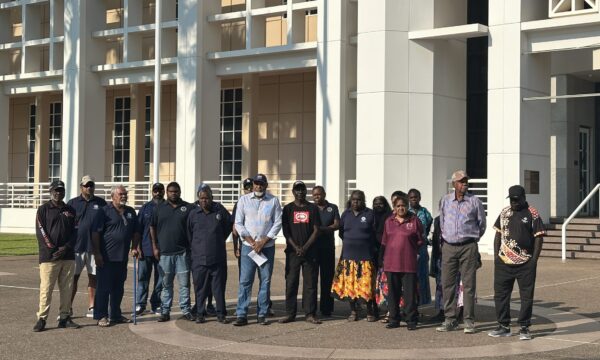
The Northern Territory’s land councils are warning a senate inquiry that proposed changes to environment laws risk irreversible damage to country, culture and communities.
The land councils are concerned that the Environment Protection and Biodiversity Conservation Bill will leave critical environmental standards to be developed after it has been passed.
“The federal government plans to push its bill through before setting important standards and is asking us to just trust them to get those right later,” CLC chair Warren Williams said.
“We’re at the frontline of climate change where heat records keep tumbling and threaten to make our communities uninhabitable. With our very survival on country at stake we simply can’t afford to take this crazy leap of faith.”
Central Land Council general manager Dr Josie Douglas will be in Canberra tomorrow afternoon to give evidence to a senate inquiry into the proposed changes to the EPBC Act and will argue they would fast-track development that harms Aboriginal people and their country.
The joint submission to the inquiry urges the senate to deeply embed climate change considerations in the architecture of the proposed legislation and in the standards’ project assessment and approval processes.
The land councils want the bill to protect Aboriginal people’s interests by giving the Indigenous advisory committee more teeth, for example the right to be consulted across the breadth of the EPBC Act.
“The recommendations to strengthen the committee don’t go far enough,” said Northern Land Council chief executive Yuseph Deen, who will join the inquiry from Darwin.
“It should be well-resourced, independent and representative of First Nations people. It should have the right to advise on the drafting of national environmental standards, monitor the impact of the bill on First Nations people and consult with traditional landowners.”
The land councils say the water trigger must apply not just to coal and gas projects, but thirsty mega-projects such as the controversial 40 gigalitre-per-year Singleton Station horticulture proposal.
They also call the proposed law’s 30-day consultation period for establishing development regions inadequate.
“We need at least 90 days to consult with traditional owners and ask for their free, prior and informed consent,” Mr Deen said.
The submission argues for a watertight standard for delegating powers under the EPBC Act to states and territories.
“The standards need to be high enough to prevent the NT government from further slashing environmental and sacred site protections,” he said. “We need strong, national standards that are enforced by the Commonwealth.”
Aboriginal Territorians hold freehold title and native title rights over 98 per cent of the NT but have been excluded from the consultations about the EPBC Act.
